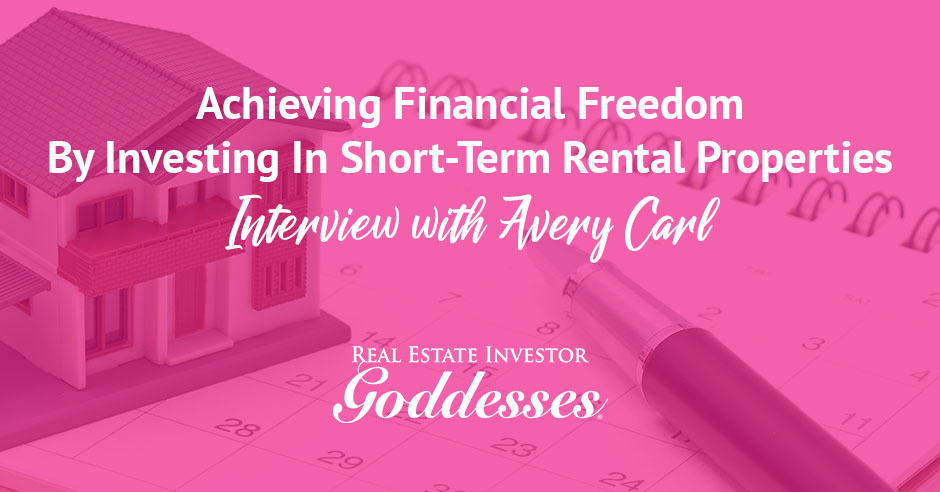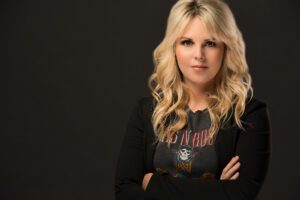
What can we buy that’s going to make us the most amount of money the fastest so that we can go buy more properties more quickly? Monick Halm discusses investing in short-term rentals with Avery Carl. Avery bought her first rental property at age 26 on a $37,000 salary. Through strategically investing in short-term rental properties in mature vacation rental markets, she was a millionaire by 31. She now owns a portfolio of 24 properties, and is the CEO and founder of the Short Term Shop. She has been taught that recognizing opportunities immediately is what makes you a smart investor. In this episode, she shares how she got into real estate and how quickly scaling that one cabin into five over the next year and a half. She also shares the things to which she attributes her success.
—
Listen to the podcast here
Watch the episode here
Achieving Financial Freedom By Investing In Short-Term Rental Properties With Avery Carl
I am super-duper excited to have with us, Avery Carl, who is such a superstar and is so inspiring. For anybody who is reading, “I am maybe too young. I don’t have enough money. It’s not possible for me to get into this game,” then this is an interview that is going to inspire you. You’ll feel encouraged to know that you can do it too. Avery bought her first rental property at age 26 with only $37,000 annual salary. Through strategically investing in short-term rental properties in mature vacation rental markets, she became a millionaire by 31. She owns a portfolio of 24 properties.
She’s a CEO and Founder of The Short Term Shop. It’s a real estate team that helps investors acquire short-term rental properties in the most recession-resistant markets. She trains the buyers on methods that led her out of the corporate rat race and into financial freedom. I’m so excited to have her. Welcome, Avery.
Thank you. I need to update my bio because I’ve got 96 doors, not just 24.
That’s a little better. It’s a four-folds increase. Tell us how you did get started. You’re young. You’re not making that much money. How did you get into real estate?
My husband and I moved to Nashville from New York City. When we went to buy a house, I didn’t have my real estate license yet. Our agent at the time was trying to get us to buy in this hipster or fast-appreciating area of Nashville. We were like, “We came from Brooklyn. We don’t want neighbors. We want to go out to the country. We want to be by ourselves.”
We bought out in the country but we did say, “Maybe there’s something too about buying a property over there where it appreciates quickly.” We thought, “Let’s buy one of those.” We had a little money left, “Maybe our future children, by the time they go to college, will appreciate it enough to pay for their college.” It’s the dumbest reason to invest in anything ever. You don’t ever want to invest based on appreciation, but that’s what we did because we didn’t know any better.
Luckily, it was a great property. The mortgage on that was $645 a month and we rented it out for $1,500 a month. It’s a pretty good cashflow on the first one. We’ve got that first rent check. We were like, “This is cool. We want more of these. Let’s build a business around this.” We started consuming all the content, listening to all the podcasts, reading all the books, and educating ourselves on it. We didn’t even know it was called real estate investing when we bought our first one. We had just enough of a down payment left for one more small single-family. We thought, “What can we buy that’s going to make us the most amount of money, the fastest so that we can go buy more properties more quickly?”
We landed on short-term rentals. We didn’t want to do it in Nashville because the regulations are crazy. It’s way too volatile. Things are always changing. We said, “Where can we go that this is not going to be an issue?” We landed on the Smoky Mountains, which is three hours East of Nashville. That’s a place where everybody that goes there rents cabins on an overnight basis. “If somebody owns these cabins, why not us?” We went and bought a cabin. We didn’t know what we were doing. We didn’t have any mentorship. We just figured it out as we went. We quickly scaled that one cabin into five over the next year and a half.
During that time about our second purchase there, we realized there are not any agents around here that can tell us anything about managing a short-term rental, how much they should be able to make or any insight or advice on that. I got my license and became that agent who bridged that gap. The Short Term Shop was born. We have offices in six markets. We’ve sold under $500 million in short-term rentals.
We’ve helped a lot of investors get into the same game as us. We have 96 stores. We would not have been able to scale our portfolio from 0 to 96 in 5 years if we had not started with short-term rentals because they cashflow so much heavier than your traditional long-term rental that we wouldn’t have been able to do it as quickly.
You can use short-term rentals to scale into more traditional passive forms of real estate. Share on XOnly eight of our doors are short-terms. The rest are long-terms. We use the short-terms to scale into more traditional passive forms of real estate. We coach people how to self-manage those remotely without the use of a property manager so that they too can squeeze every last dollar out of those properties and then buy more whatever type of real estate they want to buy.
There is one of the things that I wanted to highlight. One, in particular, was you did not invest in Nashville where you were living at for the short-term rental because of the regulations and you went to a different market. I live in Los Angeles, which has effectively banned short-term rentals as separate properties. I can’t do that. That is an issue for a variety of different markets. How do you look for markets that are going to be very amenable to this type of investment?
There’s the easy answer and then the other answer. The easy answer is to go on Google and look, but the other answer, which is how we came to it, because when we started, there weren’t all these lists on Google of best places to invest in short-term rentals like there are now. We thought of places that I went to when I was a kid or that my husband went to when he was a kid with his parents, where we rented a house or a condo and not a hotel. A lot of these are regional drivable vacation rental markets. Think of mountain markets, beach markets, lake markets, national park markets. Those are areas where historically, typically, and most of them, you have to do your research. People have been coming and renting single-family homes or condos rather than hotels for decades.
The six markets that we’re in are the Smoky Mountains in Tennessee, Blue Ridge area in Georgia, North Georgia Mountains, Gulf Shores, Alabama, the Emerald Coast in Florida, so Destin 30A Panama City Beach, Forgotten Coast, which is Cape San Blas, Port St. Joe, St. George Island, Mexico Beach and then the Disney market in Orlando. With the exception of Orlando, all of these are areas that don’t have a lot of hotels. They don’t have many primary residents either because they’re economically dependent on the tourism industry.
These are areas where people have been coming. My grandmother has been renting vacation houses in Destin since the ‘40s. People have been renting cabins in the Smoky Mountains since the ‘60s. These are areas where short-term rentals were a thing well before Airbnb came on the scene, even the internet in a lot of cases. These are places where the local cities and counties figured out how to monetize the short-term rentals with a small occupancy tax decades ago.
Those rules are very well established. They fought those battles a long time ago, whereas your Nashvilles and LAs are fighting this battle now or as of the past years because typically, when people have gone to vacation in those markets, they will have stayed in hotels. The short-term rental thing is new as of the past years in Airbnb. We look for markets where the short-term rental has predated Airbnb not all the time but typically, those are going to be the friendliest for regulations.
A couple of years ago, we bought in a mountain town, Big Bear, outside of Los Angeles. It was great. We went for that reason because we knew most of Big Bear Lake are those cabins that people rent out, and so that’s not going anywhere. The property owners wouldn’t have it. For those reading, when you’re going into vacation rentals, the location is important. Let me ask you a question. This is my favorite question because I find that we get so much more insights and learning when things don’t go well than when they do. What would you say was your biggest mistake? What did you learn from it?
The mistakes that we have made in our investing journey have been more centered around having sold things we shouldn’t have sold. We’ve got a few things. One, in particular, the very first house that we ever bought, I regret selling that all the time. We made probably $75,000 off of it, but it was a pretty high cashflow rental. When it’s gone, we’re like, “Why do we do that? That was dumb.” We haven’t made any major mistake in terms of the actual acquisition of properties yet. We’ve never looked at each other and said, “I wish we hadn’t bought this property.” We’ve only looked at each other and said, “I wish we wouldn’t have sold that.”
I have some of those too. I have known then what I know now. I still own that property, but that’s part of it. In your case, you wouldn’t have sold that one because of the cashflow.
It’s in a town about 19 miles North of Nashville where there’s a lot of development going on. We paid $165,000 for it. It was so cute. It’s on an acre surrounded by farmlands. It looks like you live on a farm but you don’t have to maintain the farm. A lot of the development is going that way. If you would have held onto it for longer, it’s going to be worth quite a bit. At some point in the next years, it will be quite a bit more. We didn’t have to sell it. Why do we do that?

Short Term Rentals: You don’t ever want to invest based on appreciation. It’s the dumbest reason to invest in anything ever.
It was already cashflowing a lot. It was in the path of progress, and there was a lot of appreciation that comes. What are you most proud of?
I am most proud of my kids. They’re awesome. I’m most proud of the fact that my husband and I decided we didn’t want to be sitting at desks all day, working for someone else, taking time away from our kids. We have gotten ourselves into a position that we wake up at 4:00 in the morning, do some things, work out before the kids get up and then get all of our work done while they’re at preschool.
We can do things like take the kids to the beach after school or the park. We can be completely 100% present when the kids are home from school. That was important to me. A lot of people want to do that and can never quite figure out how to do it. I’m very proud of us for being able to figure that out while the kids are still young.
It sounds like you set yourself up well before you had them with the real estate. What do you attribute your success? You’ve done so much in a relatively small amount of time.
It’s probably a specific set of neuroses. My husband and I both have the same mindset. I know I would be sitting at a desk for the rest of my life if I didn’t have him, and he would be doing something similar, I’m sure. I attribute our success to our partnership that neither of us would have been able to do what we’ve done on our own or even with any other partner even. Having the right support system and choosing the right partner has been instrumental for us in getting our family where we want to be.
My husband and I teach a real estate investor. There are major treats teaching couples how to invest together in real estate investing. I’m always curious to find that they hear it from people who are working super well and couples together. What would you say helps you and your husband be so successful at the partnership?
A lot of people have asked me that, and I don’t have the answer because we both went, “Do you want to do this?” “Yeah, let’s do this.” There’s no one of us trying to convince the other one, get somebody on board and try to explain why it’s a good idea. We were just like, “We’re doing this. Let’s go.” I don’t have any advice on that unfortunately.
In terms of how you work together, do you have a division of labor? Are there certain things you do or certain things he does? How do you work together?
We do. It came organically. We didn’t say, “I’m going to do this and you’re going to do this.” The way that it worked is I’ve always been the one to choose the markets. I’ll be like, “This is a good market. Let’s look at this.” I picked the market and start picking, not the houses because he does that, but I’ll say like, “Maybe we should get into multifamily in this market. Maybe we should buy a short-term rental in that market. Maybe we should stick with single-families and duplexes in this market.” I do that front-end stuff and then he does all the systems on the backend.
He’s running, managing all the properties and doing the rehabs. On the sales side of the business, I’m doing all the real estate sales. Since he is in the nuts and bolts of the management of our properties, he’s the one that teaches all of our clients how to manage everything. Everything is a 50/50 partnership. I’m more of the people person and he’s more of the engineer type. It’s fallen into the way that it is.
Open the door when opportunity knocks. Don’t be scared of it. Share on XThat’s a little similar to the range with my husband. I’m more in the front-facing people, and then he’s operations, getting things done. What advice do you have for a woman who’s starting out in this field?
You have to pull the trigger. You can analyze yourself into and out of properties 100 times and then never buy anything. At some point, you have to close your eyes and hit go.
What do you wish you’d known at the beginning that you now know?
I wish I had started earlier. I lived in Austin for six years for college, so 17 to 23. I was bartending through college. A lot of my friends who were older, who were my colleagues, were buying these $70,000 houses on the East side of Austin. I didn’t think about real estate in the way that I do. I thought, “If it’s not going to be as nice as my parents’ house, why am I going to buy a house? That’s expensive.” I wish I would have bought one of those $70,000 houses because those are million-dollar houses even they’re just three-bedroom, two-bath, little mid-century houses. They’ve gone through the roof.
That is such a common response to this question, but you started at 26, much later going, “I wish I had started in my twenties.”
I thought buying a house was this big, grandiose thing that people do. It did not occur to me that you can qualify for a loan bartending in Downtown Austin, and that I could have gotten a house. It seemed like too big of a thing for what I thought I was doing at the time.
Anyone young and reading, it’s time. Also, real estate investing is like planting a tree. What was the best time? It’s several years ago. The next best time is today. It’s always better to be good at it earlier, but you have now. Before we get into our famed end of show trinity, which is a brag of gratitude and a desire, how can people connect with you to find out more about you and what you do?
It’s right on my website, TheShortTermShop.com. Make sure you click the Schedule a Consultation button if you’re interested in buying a property. If you want to chitchat, my email is right on the frontpage, [email protected], or you can find me on Instagram, @TheShortTermShop.
It’s time for the trinity. What is one thing you are celebrating? What is your brag?
I have a book coming out on BiggerPockets Publishing called Short-Term Rental, Long-Term Wealth. That’s my brag.

Short Term Rentals: You can analyze yourself in and out of properties a hundred times and never buy anything. At some point, you have to close your eyes and hit go.
What’s one thing you’re grateful for?
Opportunity, and having been raised by people who taught me to take an opportunity as it comes along. My parents did a great job of instilling confidence in us kids to give us the ability to open the door when opportunity knocks and not be scared too.
Last but not least, what’s one thing you desire?
A ranch in Wyoming.
So shall your desire be so much better than you can imagine. Thank you so much for being here. That was awesome. It’s such a great advice. You can connect with Avery at TheShortTermShop.com. It sounds like she’s @TheShortTermShop all over the socials, so you can find her. Connect with me at REIGoddesses.com and @REIGoddesses on social media. There you’ll find out about our investor club, investing opportunities or education programs, and our upcoming events like our upcoming Real Estate Investors Soulmates Retreat. Check us out there. Make sure to subscribe and like so you don’t miss another amazing episode.
Important links
- The Short Term Shop
- Schedule a Consultation
- [email protected]
- @TheShortTermShop – Instagram
- Short-Term Rental, Long-Term Wealth
- @TheShortTermShop – Facebook
About Avery Carl
 AVERY CARL bought her first rental property at age 26 on a 37,000 salary. Through strategically investing in short term rental properties in mature vacation rental markets, she was a millionaire by 31. She now owns a portfolio of 24 properties, and is the CEO and founder of the Short Term Shop, a real estate team that helps investors acquire short term rental properties in the most recession resistant markets, and trains them on the methods that led her out of the corporate rat race and into financial freedom.
AVERY CARL bought her first rental property at age 26 on a 37,000 salary. Through strategically investing in short term rental properties in mature vacation rental markets, she was a millionaire by 31. She now owns a portfolio of 24 properties, and is the CEO and founder of the Short Term Shop, a real estate team that helps investors acquire short term rental properties in the most recession resistant markets, and trains them on the methods that led her out of the corporate rat race and into financial freedom.
Love the show? Subscribe, rate, review, and share!
Join the Real Estate Investor Goddesses Community today:





